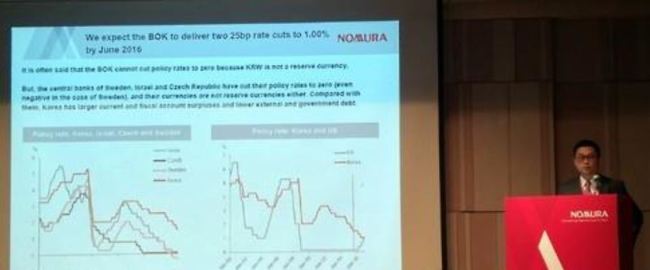Structural reform, both intentional and unintentional, in South Korea's key industries and labor market will slow its economy next year, Nomura Financial Investment Co. said Wednesday.
The brokerage firm pointed to restructuring as a key reason for its trimming of the economic growth forecast for 2019 to 2.5 percent from its previous projection of 2.7 percent.
 |
(Yonhap) |
The forecast is conservative compared with those by local state entities. The Bank of Korea put the growth outlook for 2019 at 2.7 percent, and the state-run Korea Development Institute put the figure at 2.6 percent for next year.
"Key industries, particularly auto and shipbuilding parts, have experienced structural reform and that will continue for a couple of years," Kwon Young-sun, senior Korea economist at Nomura, said in a media briefing held in Seoul.
Pointing to the negative growth in China's auto industry and GM's ongoing restructuring, the expert said the industries "appear to have experienced the global consolidation in earnest."
The restructuring in some service sectors, and self-employed businesses, will also challenge the local economy, which is an unintentional development sparked by the hike in the country's minimum wage.
This year, the government hiked the minimum wage by 16.4 percent to 7,530 won ($6.70) per hour, the biggest jump in nearly two decades. Next year's minimum wage has been set at 8,350 won, up 10.9 percent from this year.
"The Korean economy is also facing major cyclical headwinds, including the downturn in the global tech fields, the cooling down of China's property investment and the tighter financial conditions due to the interest rate hike," Kwon said.
He also said the developments regarding the denuclearization of North Korea will serve as "a key swing factor" for the South Korean economy next year, particularly for the financial market.
"How the US-North Korea talks unfold next year will decide the momentum of the inter-Korean economic exchanges, and the overall risk level of the foreign exchange market," Kwon stressed. (Yonhap)








